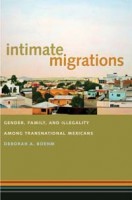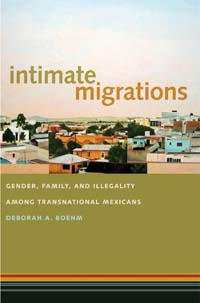 Author: Deborah Boehm
Author: Deborah Boehm
Publisher: New York University Press – 178 pages
Book Review by: Paiso Jamakar
This book is different from others on the issue of immigration of Mexicans into the United States in that it provides a human perspective to it.
Before you start thinking that this is merely a personal account of the author’s experience with people who have crossed the United States – Mexico border, this work is based on years of research based on a structured foundation of important financial and emotional issues that affect families. Its basis is well thought-out questions on critical issues that affect their lives, followed by interviews, observations, and other fieldwork in the border of the U.S. and areas in Mexico.
This book tells us of these families’ dreams, hopes, and triumphs. It also relates to us their divisions, frustrations, struggles, and tensions. It is therefore an ‘intimate’ account of their migrations – their coming into the U.S., their going back to Mexico, and sometimes, re-entering for economic survival and compelling family imperatives.
The anecdotes provided in the book made me relate well to the hardships these migrant families go through. For example, she writes: “Lucia guided me into the kitchen, where nearly 20 women and girls filled the room. They greeted me and continued their conversation about a cousin’s upcoming wedding and the recent deportation of a family friend. ‘It has been such a struggle for his wife,’ Lucia explained to me. ‘Can you imagine? Three young children, no income, such uncertainty about the future.’”
One of the important issues that Deborah Boehm studied was, one may call, that of national identity. She asked the Mexicans that if there were no barriers to movement between the United States and Mexico, where would they choose to live? Their typical response was that they would live in both countries. This is easy to understand on the basis of the U.S. providing them livelihood and Mexico the family connections. But, unsurprisingly, some of these families have established homes and families in both countries.
This book deals principally with “trans-border” families, “gendered” migrations, and children on the move covered in three distinct parts. Seven chapters and a Conclusion give the reader a look at family and survival issues that Mexican migrant families face.
The author cites some reasons for this book. She writes: “At the center of my analysis are emic,* cultural understandings of the intimate – that which is perceived as familiar and personal – and the ways that such relations both shape and are shaped by migration. This process is dialectical, one in which intimate selves and relations guide migration, and wherein transnational is changing multiple subjectivities.” (* ‘emic’ relates to, or involves analysis of cultural phenomena from the perspective of one who participates in the culture being studied).
She explains further “My research is part of a theoretical move to rethink notions of family within migration flows. Mexican migration has been guided by family relations since the 1800s. Across international boundaries and over time, “family” takes various forms, including “transnational” or “binational” families in which members are divided by distance yet maintain ties through travel and migration, communications, and remittances.”
This well-researched book adds a new dimension to the study of Mexican family migration between the United States and Mexico, pointing out the major issues that guide decisions relating to it. From that perspective it is a unique contribution by Deborah Boehme to the study of such cross-border movements.
Deborah A. Boehm is associate professor of anthropology and women’s studies and a faculty associate in the Gender, Race, and Identity Program at the University of Nevada, Reno. She is co-editor of Everyday Ruptures: Children, Youth and Migration in Global Perspective.







